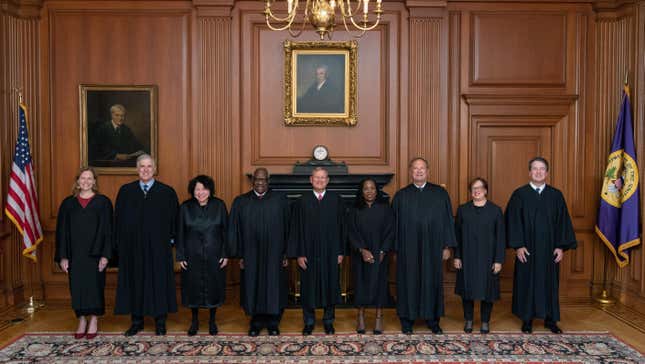This Supreme Court Term Will Be Very, Very Bad
Here are the biggest cases they’ve agreed to hear in the new term with their conservative supermajority, and what rights they could gut.
JusticePolitics

Welcome to the Supreme Court, Justice Ketanji Brown Jackson, you’re going to be writing a lot of scathing dissents.
Today (Monday) is the first day of the court’s new term. Last October, the justices began their work in a cloud of skepticism after letting Texas’ bounty-hunter abortion ban take effect. Now, after fully overturning Roe v. Wade in June, the high court is officially an unpopular institution mired in scandal that a majority of people think should be expanded and reformed. None of that will stop them from unleashing more retrograde chaos on the United States in the meantime.
In his opinion in the case overturning Roe, Justice Samuel Alito snidely noted that “women are not without electoral or political power.” That is, if they don’t like this decision, they can register their opposition at the ballot box. That’s extremely rich, given that the court in 2013 gutted the Voting Rights Act and has taken two elections-related cases that could render the landmark law even weaker.
This court will continue making the absolute most of its 6-3 conservative supermajority, wherein the conservatives—led by Alito and Clarence Thomas—don’t even need the vote of Chief Justice John Roberts to drastically upend legal precedent. (It only takes four votes to hear a case and five to decide one.) They know they’re basically unaccountable to Congress or the public and will use their unchecked power to destroy voting rights, erase the separation of church and state, and gut the government’s ability to fight climate change.
Here are the biggest cases they’ve agreed to hear this term, and what they could gut (so far, there could be some abortion cases added):
Voting rights (Merrill v. Milligan, Moore v. Harper)
These cases are not only bad on an individual level, but they could affect the 2024 presidential election. In Merrill, the state of Alabama is trying to uphold a congressional map that lower courts said was racially gerrymandered and diluted the votes of Black residents. It’s an attack on what remains of the Voting Rights Act—Section 2, which prohibits voting rules that discriminate on the basis of race.
Moore is about a crackpot legal theory that state legislatures have near-unlimited authority over federal elections including the power to ignore the pesky Voting Rights Act and to select their own presidential electors. (It’s called the independent state legislature doctrine, and you’re going to hear a lot of election deniers talking about it.) The theory is rooted in Bush v. Gore in which the court handed the 2000 election to the guy who lost. Not great!
Anti-discrimination policies (Students for Fair Admissions, Brackeen v. Haaland)
Conservative activist Edwin Blum is spearheading lawsuits against affirmative action policies at both Harvard University and the University of North Carolina via his group Students for Fair Admissions. Lower courts held that the schools’ policies “used race in a sufficiently limited way to fulfill compelling interests in diversity,” per CNN. But plaintiffs argue that Harvard discriminates against Asian students, while UNC discriminates against Asian and white students. They’re saying affirmative action is a form of discrimination.
In Brackeen, the plaintiffs say that the Indian Child Welfare Act—which aims to place Indigenous children with family members or tribal members before anyone else to help them stay connected to their community—discriminates against white would-be adoptive parents. They are literally arguing reverse racism. The court accepted the case before it overturned Roe and it’s being seen in a different light after the court greenlighting more criminalization of pregnancy and suggesting that women don’t need abortion access when adoption exists. Brackeen is a Trojan horse for undermining Native sovereignty more broadly; first attack ICWA, then other federal protections.
-

-

-

-

-

-

-

-

-

-

-

-

-

-

-

-

-

-

-

-

-

-

-

-

-

-

-

-

-

-

-

-

-

-

-

-

-

-

-

-








































